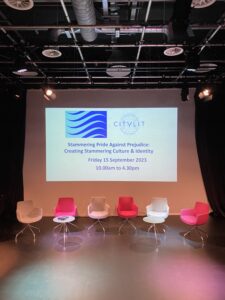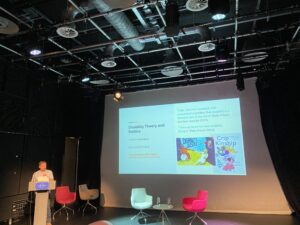I have grown up smothered by a veil of shame, too scared to speak or even open my mouth. My stammer was “crippling” or “disabling” and it defined every inch of my being and my experiences. There was not only a lack of pride (I never dreamt that pride and stammering could be used in the same sentence) but a deep-seated feeling of inferiority.
At school and university, I was excused from oral exams and once again, everything was done to pathologise and silence the stammer. Suddenly, attending an event that not only was run for and by people who stutter but also dared to celebrate it was overwhelming. I bought my place for the Stammering Pride Against Prejudice day safe in the knowledge that I wouldn’t go, but after discussing it with a therapist from City Lit, I bit the bullet and met her there.

I was greeted by stammering voices, surrounded by dysfluency and broken speech (as I would have labelled it then). To be completely honest, I felt totally overwhelmed. There was such a sense of acceptance, people tripping over their words unashamedly (and to me, shame was the word of the day, stuttered or not). People went out of their way to introduce themselves to me and, for possibly the first time, I dared say my name.
I wasn’t sure what I was expecting out of the presenters yet one thing was clear. I was convinced that we would be lectured about how we should feel about our speech, how we should be reaching for fluency, that blending in with fluency was important, and yet it couldn’t have been more different. Every single speaker stammered and did so openly and with good humour (“we’re on stammer time”).
Intersectionality was one of the keywords for the day and as someone who has significant mental health problems, it was an insight into how these different aspects of our lives interact and influence our treatment and also wellbeing, Creativity was also a mot du jour, with visual representations of stammering both inspiring and humorous.

To me, the speaker of the day was none other than Josh St Pierre, with a brief introduction to crip culture, the importance of turning away from the medical model and towards transformative belonging. He also gave me my new mantra – “it takes two to stammer”. It is not just my responsibility to communicate what I want to say, it goes both ways.
There was plenty of time to network and I was almost excited to have an opportunity to talk without constantly apologising or worrying about eye contact. I just felt so radically accepted. There was no judgement when it took me three minutes to say my name, no shocked looks when I jolted my head to the side in an attempt to get out of a block, no smirks when I was stuck. For the first time in my life, the therapists were there to learn from us, not the other way around. We were proud.
And you know the main thing that I took away from the event? It turns out that I’m actually pretty good at stammering. Sticking that on my CV.
By Lottie